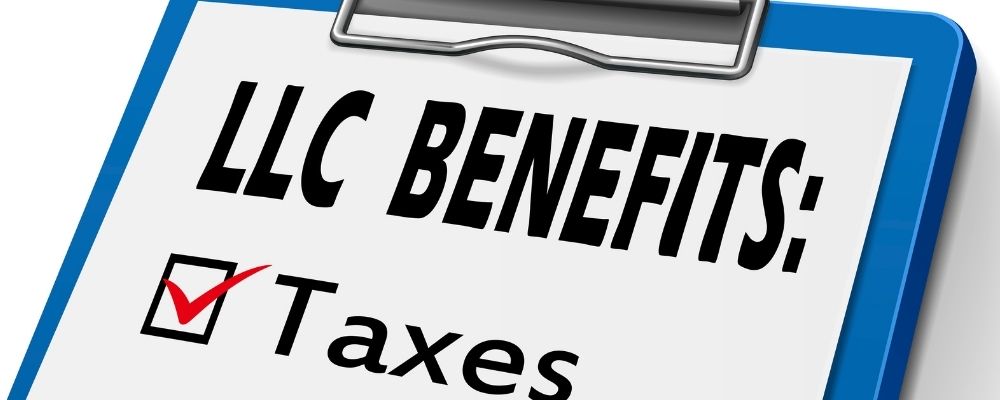A Limited Liability Corporation – or LLC – is a popular business structure for real estate investors because it offers flexibility, legal protection, and tax advantages. But you have to know how to properly set up and maintain your business to reap the rewards. Here is a look at a few benefits of llc for rental property owners, along with some of the disadvantages.
Key Points
Tax Benefits of Using an LLC for a Rental Property
1. Pass-Through Taxation
One of the biggest tax benefits of an LLC is pass-through taxation. LLC’s are popular amongst entrepreneurs because they offer some of the key benefits of a corporation – such as protection of personal assets. But they are taxed the same way as a sole proprietorship – meaning that owners must report any business income on their personal tax return.
Single-member LLC’s are considered a disregarded entity by the IRS – which means that they are not subject to the same tax laws as a corporation. Corporations must pay taxes on their business income and then individuals must also pay taxes on their income from that business, which means they get taxed twice. An LLC allows business owners to avoid that double taxation and only pay taxes on their business income.
2. Separate Business and Personal Expenses
Another major benefit of setting up an LLC is the ability to separate personal and business income. Most banks recommend that you set up an LLC or some business entity before opening a business account for personal liability protection. This will also allow you to establish a business checking account and credit cards so you can effectively separate your personal and business income. This is important to do in case of any lawsuits or audits from the IRS.
3. You Can Deduct Mortgage Interest
As an owner of a single-member LLC, you can often deduct mortgage interest from your taxes. Being self-employed means that you pay taxes on the profits of your business after any expenses. Multiple member LLCs and corporations have separate rules regarding taxation that are a bit more complicated. But if you purchase a rental property with a single-member LLC, you can deduct the mortgage interest as an expense, while still insulating yourself from liability.
Disadvantages of Creating an LLC for Rental Property
1. Upfront Costs
One of the major disadvantages of setting up an LLC for rental property is the upfront costs. The price of setting up an LLC varies depending on the state and can range from $40 to $500. Plus, if you use a lawyer or business consulting service to establish the entity, they will likely charge you a fee as well. This can get especially costly if you have a large portfolio of properties and want to set up a different entity for each one.
What’s more, you also have to pay an annual or biannual fee to keep the entity active, which can also become expensive if you have multiple LLC’s. Some states even charge what is called a franchise tax, which is a tax that certain entities have to pay to operate in a particular state. Not all states charge a franchise tax, but it’s something to be aware of if you are thinking of setting up an entity.
2. Self-Employment Tax
Another important thing to consider is that there are certain drawbacks of pass-through taxation. Setting up an LLC does not mean you don’t have to pay taxes; it means that the income generated from the business is subject to self-employment tax, which can end up higher compared to being taxed as an employee. Those taxes are not automatically deducted from your earnings, so it’s up to you to set aside enough to meet your yearly or quarterly tax obligations.
If you’re going to set up an LLC for your rental property, it’s important to hire an accountant to set up your books and make sure you have enough set aside to pay your taxes. That way, you don’t get hit with a massive bill at the end of the year.
3. Higher Interest Rates and Fees
Banks and other lenders often charge higher interest rates to those purchasing a property with an LLC and they likely won’t lend to you if you don’t already have solid banking and credit history. This is because if anything goes wrong, it’s easier to walk away from an LLC than if the mortgage is in your name. Therefore, it’s a riskier deal for the lender and they may charge higher interest rates and other fees to compensate for that risk.
How is Rental Income Taxed in an LLC?

Landlords who own a rental property in their own name will file their rental income and any related expenses on a Schedule E form from the IRS. If you purchase the property using a business entity such as an LLC, you will instead file IRS Form 8825. But LLCs do not require any additional paperwork or tax filing, so you don’t get taxed twice. You will simply file any income earned from a rental property on your individual tax return and pay self-employment tax.
Can You Avoid Paying Tax on Rental Income?
You can’t avoid paying taxes, but with a good accountant, you can find legal deductions to reduce your tax bill. You can deduct expenses such as mortgage interest, insurance costs, advertising, payments to a property manager, and any legal or professional services required to maintain the property.
There is also a tax law called the Qualified Business Income Deduction. The QBI deduction allows individuals to deduct as much as 20% of their business income from their taxes if received through a pass-through entity – such as an LLC. So, this can be another good way to reduce your tax obligations related to rental income.
Should You Set Up an LLC for Rental Property?
It all depends on your goals and strategy as an investor. LLC’s provide a flexible, easy to manage business structure that offers a liability shield to protect your personal assets if your business gets sued. Plus, they offer your business an added layer of professionalism and a variety of tax and legal advantages. However, they can also be costly to set up and require a bit more expertise to maintain and obtain funding, than remaining a sole proprietor.
If you have a modest portfolio and want to protect yourself and individual properties from liability in the event of a lawsuit, LLCs are a useful and flexible alternative to setting up a formal corporation. But if you aren’t particularly interested in expanding your portfolio beyond one or two rental properties, it may be easier to avoid incorporating and simply continue on as a sole proprietor.



